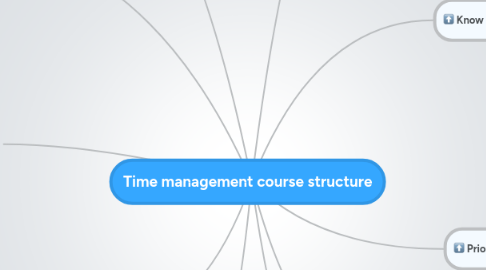Time management course structure
by Rob Hubbard


1. Know yourself
1.1. Time as a resource
1.1.1. Identify your life objectives
1.2. Keep a time log
1.2.1. Keep a time log
1.3. Varying productivity during the day
1.3.1. Recognising your effective times of the day
1.4. Organising your day
1.4.1. Plan your day for productivity
1.5. The Pareto Principle
1.6. Parkinson's Law
1.7. Pressure and stress
2. KEY
2.1. = goal
2.2. = theory
2.3. = activity
3. Prioritise what you need to do
3.1. Urgent versus important
3.2. Categorising urgent and important tasks part 1
3.2.1. Prioritising practise
3.3. Categorising urgent and important tasks part 2
3.3.1. Categorise your tasks
3.4. Perfect and good enough
3.5. Write things down
4. Manage meetings more effectively
4.1. Principles for effective meetings
4.1.1. Make your meetings more productive
5. Control your internet use
5.1. Internet use tips
5.1.1. Reduce your recreational use of the internet
6. Learn to say no
6.1. How to say no
6.1.1. Practice saying no
6.2. Tips for saying no
6.2.1. Experiences of saying no
7. Avoid distractions and interruptions
7.1. Your distractions
7.1.1. Identify your distractions and interruptions
7.2. Handling interruptions
7.2.1. Identify strategies to manage interruptions
8. Plan tasks and objectives
8.1. Tasks and objectives
8.1.1. Aligning tasks to objectives
8.2. SMART planning
8.2.1. Plan your tasks
8.3. To-do lists and flexibility
8.4. Gantt charts part 1
8.4.1. Create a Gantt chart
8.5. Gantt charts part 2
8.5.1. Create a Gantt chart for your project
8.6. Six thinking hats
8.7. Activity, productivity and presentee-ism
8.8. Taking breaks and holidays
8.9. Mind maps
8.10. Be conscious of time
9. Manage email more effectively
9.1. Decide whether to send an email
9.2. Tips for managing email
9.2.1. Identify the changes you will make
